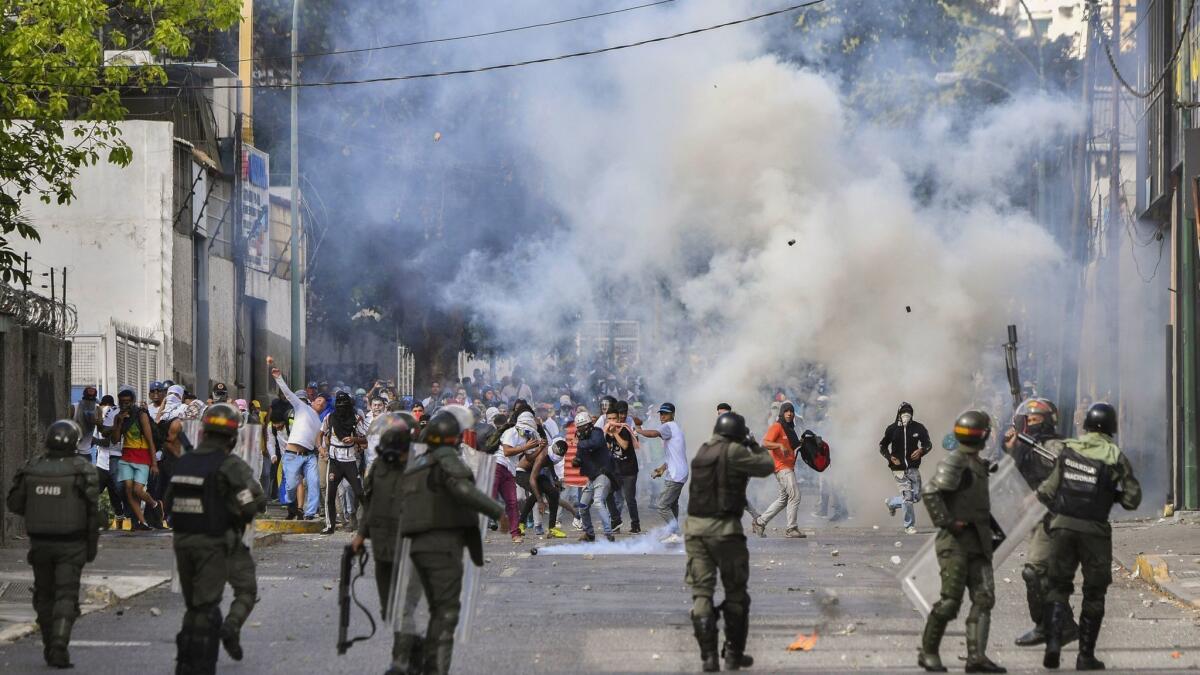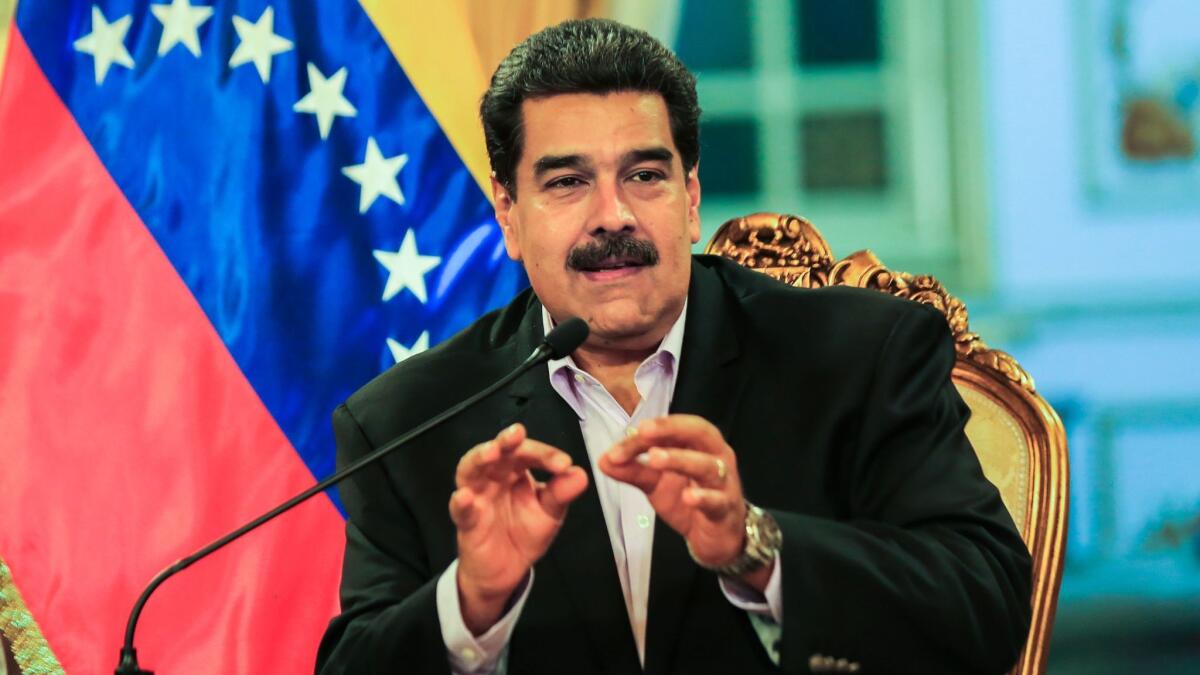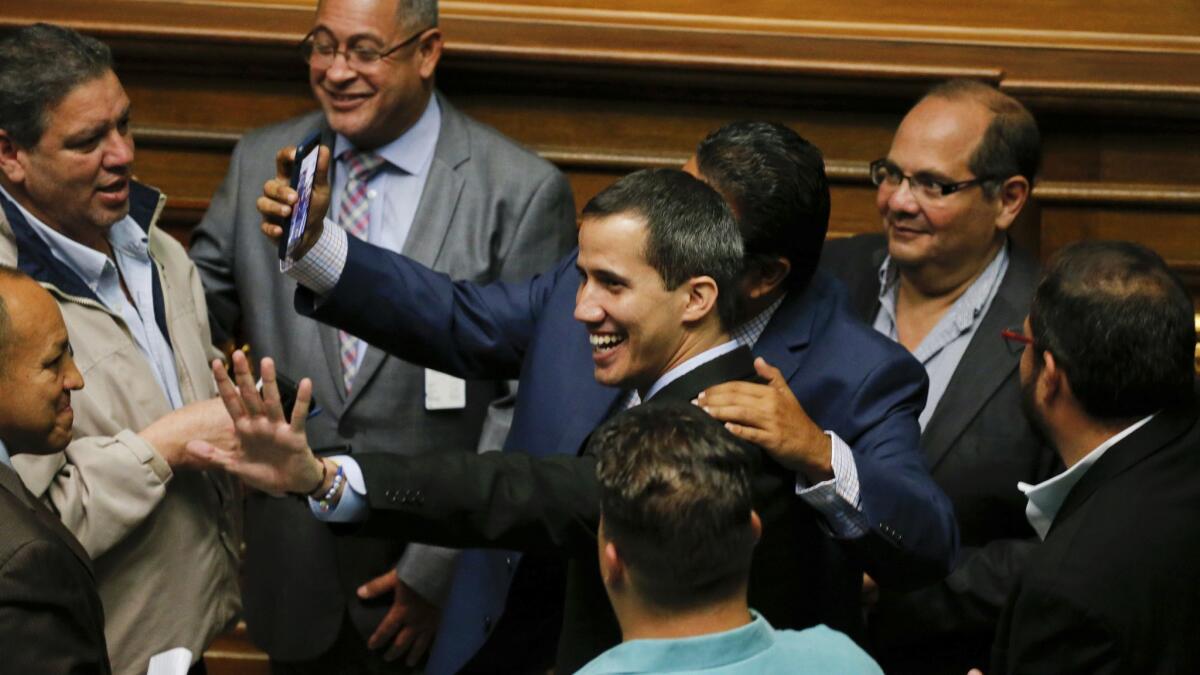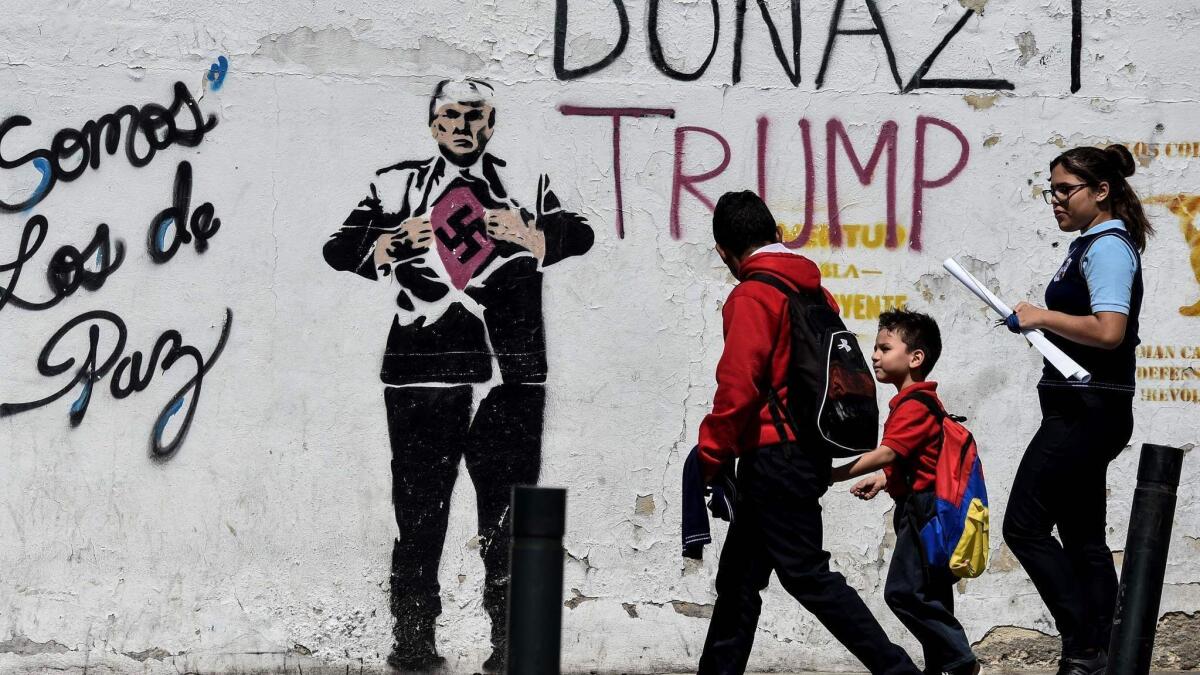Venezuela’s Maduro unleashes military, launches criminal probe of rival Guaido

- Share via
Reporting from Caracas, Venezuela — The Trump administration on Tuesday threatened “serious consequences” against the government of President Nicolas Maduro for opening a criminal investigation into the country’s U.S.-backed opposition leader, a possible precursor to arrest.
And Maduro, defiantly resisting attempts to oust him, brandished his most potent weapon: the military. In a bellicose speech, he announced the creation of “popular defense units,” armed civilian squads comprising 50,000 fighters instructed to expand the army’s reach by putting down anti-government resistance in neighborhoods across Venezuela.
Both the criminal investigation and the formation of the defense brigades reflected Maduro’s decision to dig in and rebuff the mounting domestic and international pressure aimed at toppling him amid abject poverty and famine. The standoff is precarious and fraught with risk for both Maduro and the U.S.-backed opposition.
Venezuelan Atty. Gen. Tarek William Saab asked the country’s top court to ban self-declared acting President Juan Guaido from traveling outside the country and to freeze his bank accounts. Guaido, a little known 35-year-old politician, is attempting to unseat Maduro and has received wide international support in his quest.

The Supreme Court is stacked with Maduro supporters, so it will probably rubber-stamp Saab’s request. Saab said Guaido was being investigated for the unrest related to his declaration as the nation’s legitimate leader. Guaido said he believes Maduro’s supporters are preparing to arrest him.
President Trump’s national security advisor, the hawkish John Bolton, denounced the threats from Maduro’s “illegitimate former” government. “There will be serious consequences for those who attempt to subvert democracy and harm Guaido,” Bolton said on Twitter.
Bolton and others in the administration have previously demanded safety for Guaido, opposition activists, and U.S. diplomats who remained in the capital of Caracas despite Maduro’s deportation order, which he later rescinded.
Hundreds of anti-government demonstrators have been arrested in recent days, according to human rights groups, but Guaido has avoided such a fate, in part by limiting his public appearances and measuring his words.
After the criminal investigation was announced, Guaido said he was not surprised.
“This was to be expected from a regime that does not resolve the Venezuelans’ problems and whose only response is repression and persecution,” he said.

The move against Guaido came a day after Washington imposed some of its toughest sanctions yet on Venezuela, this time targeting its oil industry, its major source of revenue.
Bolton and Treasury Secretary Steven T. Mnuchin said the punitive actions would cut Maduro’s access to about $7 billion in oil sales, which would be put in escrow until Guaido’s eventual government could take possession.
The administration had resisted oil sanctions out of fear they could disrupt the market, hurt U.S. refineries that process Venezuelan crude and raise gasoline prices in the United States. But officials said they believed they could avoid such damage.
“The United States will not let Maduro and his cronies continue to loot the assets of the Venezuelan people,” Bolton said.
Maduro reacted defiantly.
Dressed in army green with his trademark military beret, Maduro convened his top commanders at the Libertad air base in north-central Venezuela. Under the slogan “Loyal always, traitors never,” the commanders affirmed their fealty as Maduro essentially declared war.
“This battle is being decided by the moral superiority and advantage of the Fatherland, by physical superiority and advantage, by legal, constitutional superiority and advantage,” Maduro proclaimed.
“Once again, we will emerge victorious.”
Maduro has blamed the uprising against him on Trump, warning the U.S. president to “take your hands off” Venezuela. He accused Trump of staging an illegal coup with ultimate designs on Venezuela’s oil reserves, the largest in the world.

The brigades that he announced were reminiscent of shock troops frequently used by autocratic governments to spy on and control dissident populations. The ruling party was already heavily militarized; Maduro and his predecessor, the late Hugo Chavez, established four paramilitary branches to exert control and shore up the government.
In another effort to make Guaido’s rule a fait acompli, U.S. Secretary of State Michael R. Pompeo certified that Guaido has authority to take control of bank accounts that Venezuela’s government has in the Federal Reserve Bank of New York or any other U.S.-insured banks.
Pompeo said the certification will “help Venezuela’s legitimate government safeguard those assets for the benefit of the Venezuelan people.”
Guaido has been recognized as the nation’s rightful leader by two dozen nations that contend that the reelection of Maduro was a sham, in part because his strongest opponents were barred from running.
Violent street demonstrations erupted last week when Guaido, during a massive opposition rally in Caracas, declared that he had assumed presidential powers and planned to hold fresh elections, ending Maduro’s “dictatorship.”
The United States, Brazil, Canada, Colombia, Argentina, Peru, Ecuador and Paraguay are among the nations to officially acknowledge Guaido as the legitimate interim head of Venezuela, while countries including Russia and China back Maduro. Mexico and Uruguay have not recognized Guaido but are attempting to promote negotiations.
The U.S. State Department, meanwhile, said that Americans shouldn’t travel to Venezuela, warning of unrest, the threat of being arbitrarily arrested and of mass demonstrations occurring with little notice.
Opposition leaders have called for anti-government rallies this week.
The announcement raises the travel advisory to its highest level, putting Venezuela on a no-travel list that also includes Syria, Afghanistan, Iraq and South Sudan.
Special correspondent Mogollon reported from Caracas and Times staff writer Wilkinson from Washington.
More to Read
Sign up for Essential California
The most important California stories and recommendations in your inbox every morning.
You may occasionally receive promotional content from the Los Angeles Times.














